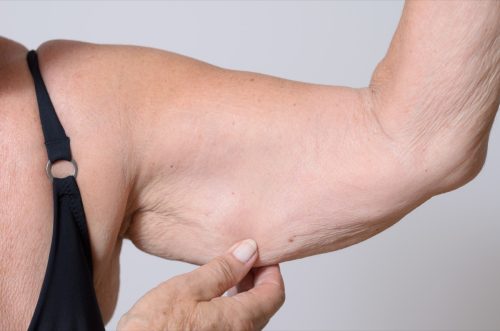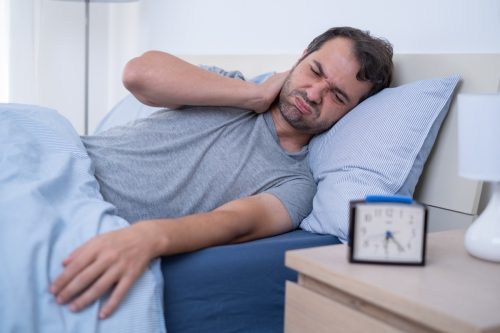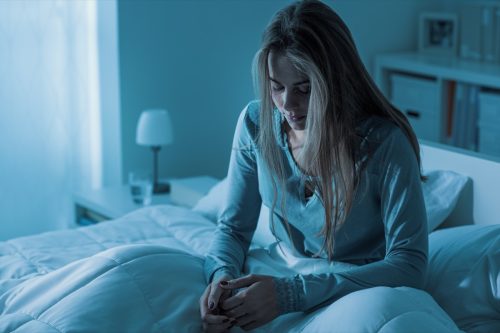Four Tell-Tale Signs of Low Testosterone
As we age, it’s normal to lose some of the vitality of our youth—and for men, declining testosterone levels are a perfect example of this. The average adult man’s testosterone production starts to drop around age 40 and decreases by one to three percent each year after. Though this drop is standard for men as they get older, some develop male hypogonadism (low testosterone, or “low T”), in which the testicles don’t produce enough testosterone. In fact, the Cleveland Clinic reports that around two percent of people assigned male at birth (AMAB) may have low T. In comparison, other studies have estimated more than eight percent of those AMAB between the ages 50 to 79 are lacking sufficient levels of the male sex hormone.
Low testosterone levels can negatively impact your life and vitality in several ways. Cory Rice, MD, owner of Modern Medicine and Chief Clinical Advisor for Biote, tells Best Life, “Low testosterone has been associated with many adverse health conditions, including erectile dysfunction, obesity, low bone and muscle mass, depressed mood, and decreased quality of life.”
While you may think your testosterone levels are fine and dandy, it’s still a good idea to know the common signs of low T so you can talk to your doctor and address them before they lead to health complications. Read on for what doctors say are four tell-tale signs of low testosterone.
READ THIS NEXT: 5 Medications That Could Be Lowering Your Libido.
If you’ve been inexplicably tired, unmotivated, and lacking energy, then issues with your hormonal health, such as low T, could be to blame.
One of the most common symptoms of insufficient testosterone production is low energy. Amy Killen, MD, a regenerative medicine physician and medical advisor at Joi Women’s Wellness, tells Best Life, “Extreme fatigue and lack of motivation are common symptoms in men suffering from low testosterone. Despite getting adequate sleep, they may find it harder to get up in the mornings. Also, many men with low testosterone have difficulty motivating themselves to do things that used to be easy, like going to the gym, mowing the lawn, or going to social events with friends.”
READ THIS NEXT: FDA Says to Avoid These OTC Antacids in New Warning.

Low testosterone issues aren’t exclusive to men. Women can also experience symptoms associated with low T, such as loss of muscle. “The inability to build and maintain muscle is often due to a lack of testosterone in both men and women,” says Rice. “Despite regular exercise and muscle training, many men and women with low testosterone will get frustrated with their inability to see improvements in their strength and body composition.”
A 2018 study published in The World Journal of Men’s Health found that low testosterone levels are associated with loss of muscle mass and function and “unfavorable body composition changes.” Killen adds, “Testosterone is an anabolic hormone that signals the body to use its energy reserves to build muscle. When men are without testosterone, the body will opt to store energy as fat instead. In addition, men suffering from low testosterone will often note an increase in belly fat.”

A surefire sign of low T is having a low sex drive. Other common symptoms related to libido decline and sexual health include erectile dysfunction, fewer spontaneous erections, lessened fertility, small testes, gynecomastia (“man boobs”), loss of body hair, and an inability to achieve orgasm, according to a study published in Frontiers in Endocrinology in 2019.
“One of the early symptoms of low testosterone in men is a reduction in morning erections. A healthy man will have erections during REM sleep at night and often wake up with an erection in the morning,” explains Killen. “When testosterone levels drop, these morning erections also happen less often. At the same time, men may experience a reduction in libido or sex drive.”
For more health news sent directly to your inbox, sign up for our daily newsletter.

While most people find they have a more challenging time falling and staying asleep as they get older for various reasons, poor sleep quality can signal low testosterone. In a 2019 study published in the World Journal of Urology, researchers collected data from the 2011-2012 National Health and Nutrition Examination Survey (NHANES). They looked at the relationship between testosterone levels and sleep duration in U.S. adult males aged 16 to 80. They concluded that impaired sleep and aging were associated with low testosterone.
Interestingly, another study from 2015 found that older men with increased sleep duration of up to 9.9 hours had higher testosterone levels than men who didn’t get enough sleep. Conversely, sleeping longer than 9.9 hours was associated with low T. “Testosterone helps men and women achieve optimal, restorative sleep,” Rice explains. “As men and women age, the levels of this critical sex hormone decline. Therefore, lack of testosterone can worsen sleep patterns among men and women.”
" Conservative News Daily does not always share or support the views and opinions expressed here; they are just those of the writer."




Now loading...